The Checker Maven
The World's Most Widely Read Checkers and Draughts Publication
Bob Newell, Editor-in-Chief
Published every Saturday morning in Honolulu, Hawai`i
Noticing missing images? An explanation is here.
Hopeless

Sometimes we feel like we've reached the end of our rope and there is just no hope and nothing can be done any longer. It happens to us all at times, and then we need to draw on whatever internal and external resources we have at hand, and try to pull ourselves back up.
Consider our heroine above, who wishes things could have begun differently, and presumably led to a different outcome. Surely, she must have been referring to a game of checkers in which she misplayed a difficult 3-move ballot. Well, cheer up, young lady, you can always play another game and improve on your results.
This week's problem selection certainly belongs to the seemingly "hopeless" category. Consider the position below.
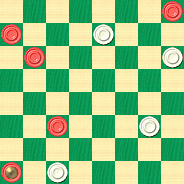
WHITE
White to Play and Draw
W:W7,12,24,30:B4,5,9,22,K29.
White is down a man and looks to be in rather bad shape. Is it truly hopeless? Should White just throw in the towel and resign?
This problem is an object lesson in the wisdom of the old adage, "Never give up hope." In fact, White can get a draw if he maintains his courage and composure. Can you find the right moves? Hope springs eternal! When you're satisfied with your answer, click on Read More to see the solution.![]()
X the Unknown

Wouldn't it be nice if, during one of our games, it was our turn to play and suddenly a sign flashed, "Black to Play and Win"? We'd then know to look extra hard for that winning move, and we'd have a good chance of actually finding it.
But real life is not so user-friendly. There are no flashing signs telling us what to do next. If there's a win on the board, we have to both know it's there and find it. Every position is an "X the Unknown" to be solved on our own.
That's why problems with terms like "White to Play, What Result?" are at once frustrating and practical. Frustrating, in that we'd at least like an idea about what we're supposed to do. But practical, in that they mirror the real world of cross-board play, with an unknown result awaiting us at each and every move.
Today's problem is taken from the real world of master play, from a long-ago cross-board game. Can you discern the result and find the right line of play? We're offering you no further information. Here's the position.
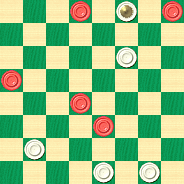
WHITE
White to Play, What Result?
W:W32,31,25,11,K3:B23,18,13,4,2.
Can you master the unknown, or will you be X-ed out? When you've worked your way through, though, it's no unknown that clicking on Read More will show you the solution.![]()
The Leaves Fall Quickly in the Fall

How fast do the leaves fall in the Fall? It seems like the season is all too brief. There is a short period of spectacular color and then, suddenly, it's over, and in much of North America we're left with nothing but a big raking and cleanup task.
For our October speed problem, we've chosen to mimic the season by presenting a problem which goes by pretty quickly. One minute the clock starts, and then, seemingly in seconds (actually it is in seconds), time is up.
Of course this means that the problem is in the easy category (and we've seen problems like this before), so we'll expect you to solve it in 15 seconds. When you're ready, let your mouse fall on the link below.
October Speed Problem (easy; 15 seconds)
To drop down to the solution, simply flutter over to Read More.![]()
Secret Hideaway

Don't tell anyone, but The Checker Maven has a secret hideaway.
Unfortunately, it isn't a bungalow tucked away on a remote tropical island, much as we might wish; but for a checker fan, it might be something even better: we have a hidden stash of checker problems.
No, we're definitely not telling. But in our weekly columns, little by little we'll share some (maybe even all) of the contents of our secret checker problem hideaway with you. Today, we'll start with a deceptive little situation of the "what result?" variety. Take a look at the diagram below.
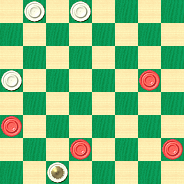
BLACK
Black to Play, What Result?
B:W32,31,20,K3:B17,12,7,5.
We can't offer a week's vacation in Paradise as a prize for solving this one; we can only promise you self-satisfaction and a feeling of accomplishment. Tease out the secret and then click on Read More, which will reveal the solution's hideaway.![]()
Labor Day Race, 2009

The runners above are taking part in an event called the Saguaro Race, held on Labor Day weekend in Arizona. There's a choice between a more serious eight-mile event, or a two-mile "fun" event. Given the heat of the Arizona desert, and our less than stellar endurance, we know which one we would opt for--- but to each his own, and we're certain that a good time will be had by all.
As our own celebration of Labor Day, the holiday set aside for recognizing the ordinary worker who makes America great, we offer our own race, and we promise that it's much less taxing than the Saguaro event. It's a race against the Javascript clock to solve a checker problem before time runs out. The problem will tax your brain, but not all that much, so we'll give you 30 seconds to figure it out. (The Saguaro participants, no matter which event they choose, can't possibly finish that fast!)
Click on the link below to display the problem, then come back and click on Read More to see the solution.
September Speed Problem (moderately easy, 30 seconds)
![]()
Smaller Than Life

On the opposite end of the "larger than life" spectrum is the "smaller than life" world of miniatures. We're fascinated by the tiny books shown in the photo above, although we do know that unfortunately they aren't checker books. However, checkers has its own world of miniatures, and today we're pleased to bring you another miniature problem. We like to publish these from time to time; while they are not everyone's cup of tea, they are elegant, entertaining, and nearly always applicable to practical play. Shown below is one that we think merits all of the previous adjectives.
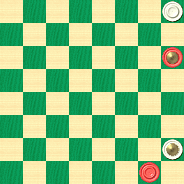
BLACK
Black to Play and Win
B:W29,K5:BK21,1.
Give the problem a "good little try" and then click on Read More to see the "little old solution."![]()
Beat the Heat

August in most of the Northern Hemisphere brings some of the hottest weather of the year. We know that here in our Santa Fe offices, located in New Mexico's high desert country, it's hard to think about moving very fast in the blistering heat of summer. But nevertheless, we invite you to "beat the heat" with our August speed problem, an offering that isn't so easy and is perhaps a little over the top for speed solving.
Taking all this into account and allowing for the summer heat, we'll give you extra solving time. In fact, we'll go so far as to allow you three minutes to find the solution. Generous, aren't we?
When you're ready, click on the link below to display the problem and kick off the red-hot Javascript timer. Come back and click on Read More when you're ready to see the solution.
August Speed Problem (moderately difficult; 3 minutes)
![]()
Happy Birthday America
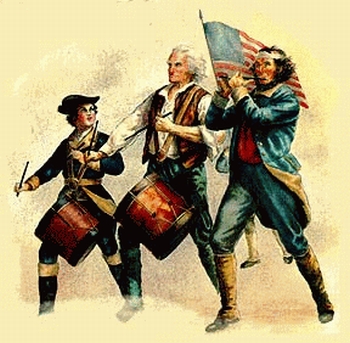
The Fourth of July, as we know so well, celebrates America and recalls the story of the brave band of patriots who, back in the 1770s, brought our nation into existence and gave life to the American dream. We've said before, and we'll say it again, that we're unabashed patriots ourselves, and personally owe much to America.
Celebrating the Fourth of July is something we love to do, and we'd like to once more carry that over to The Checker Maven and present a checker problem from the dean of American problemists, the legendary Tom Wiswell.
Mr. Wiswell's problems are not known for being easily, but they are worth the effort taken to solve them, and they never fail to delight. Diagrammed below is today's selection.
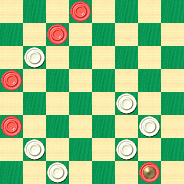
WHITE
White to Play and Win
W:W9,19,24,25,27,30:B2,6,13,21,K32.
White is a man up, but Black has a king and will quickly get the man back. How can White win this one? The solution is amazing. Don't give up too quickly; you'll be richly rewarded if you do solve it. When you've drummed up your answer, click on Read More to see the revolutionary solution.![]()
A Gentle Stroke

We thought we had completely run out of puns on the word "stroke" until the one above finally came to mind. Now, the Checker Maven offices have a strict no-pets policy, but it's hard to resist the charm of the photo above.
Today's problem is indeed a stroke, but is gentle in that it's less difficult than usual. We invite you to practice your visualization skills on the diagram below.
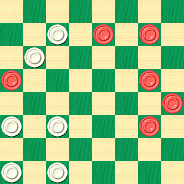
WHITE
White to Play and Win
W:W6,9,21,22,29,30:B7,8,13,16,20,24.
When you've worked it out to your satisfaction, stroke the Read More button to see the solution.![]()
Tina and Joey

Tina
"Hey there, Sweetie!"
The raspy voice cut through the thick Florida air and Tina's arms and face burst out in goose bumps as she involuntarily shuddered. It was that horrible boy Joey again, pestering her as he did nearly every morning. No doubt he would ask her out for lunch ...
"Wanna go for lunch with me, Sweetie?"
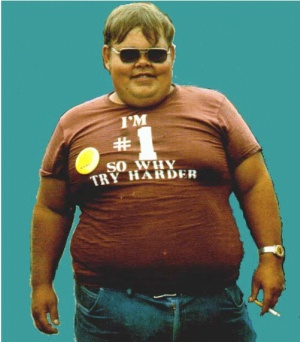
Joey
Tina kept her head up and her eyes straight ahead as she walked by, refusing to answer. As she passed Joey's position, he blew a lungful of cigarette smoke in her direction. Tina's eyes started to water and she couldn't help but cough.
"Wassa matter, Sweetie, got a cold and lost your voice?" Joey started to chuckle, self-amused.
"Joey, you are a disgusting boy, and if Coach Hovmiller catches you smoking, he'll throw you off the checker team ... and good riddance, too! I just think I'm going to report you this time!"
"Aw, Sweetie, you done that before and it didn't do nothing. It was your word against mine and ole Hovmiller couldn't take no kinda action. Why dontcha just go for lunch with me and kiss and make up?"
"Joey, I'm going to wipe that grin off your face! Just wait and you'll see!" Tina strode along the path as quickly as she could and soon reached the safety of the school building. Inside, breathing hard and on the verge of tears, she balled her fists and proclaimed, "I'm going to fix that boy good!"
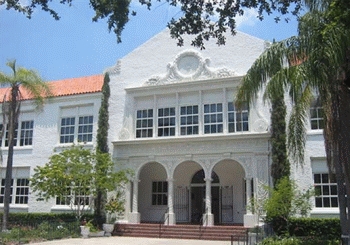
Tina knew that Joey had cheated his way on to the checker team, and continued to cheat to keep his place. Coach Hovmiller, although a rather stern leader, had yet to catch on to Joey's tricks.
But the school day passed as it always does, and soon it was three o'clock and time for team practice. Today Coach Hovmiller had scheduled the next round of the team board placement tournament. And, wouldn't you know, Tina was paired up with Joey. Tina sighed when she saw the posting on the wall chart. Why couldn't she be matched with Tommy Wagner, or even that nice boy Kevin? Tina smiled a little when she thought about Kevin...
"Sweetie! Hey, Sweetie! You ready for some action?" Joey snickered as he said the last words.
"Don't you be fresh with me, Joey!" said Tina, "or I'll ... I'll...."
"You'll what?" replied Joey. "Turn me in to the Coach like you said this morning? Oooh, I'm so scared! Hey, let's play our game. Tell ya what, how's about winner gets to ...."
"Oh, you just keep quiet, you awful boy!" said Tina. "Let's play our game and get it over with!" Without further discussion, they sat down at their assigned table and began to play. Tina had the White pieces; Joey lead off with Black.
| 1. | 10-14 | 24-20 |
| 2. | 6-10 | 22-17 |
| 3. | 11-15 | 17-13 |
| 4. | 1-6 | 25-22 |
A weak move; 28-24 is much better.
| 5. | 14-18 | 23x14 |
| 6. | 9x25 | 29x22 |
| 7. | 8-11 |
Black is somewhat better off here.
| 7. | ... | 27-23 |
| 8. | 4-8 |
This gives up the advantage; 15-19 would have kept a comfortable lead for Black.
| 8. | ... | 23-18 |
| 9. | 15-19 |
The tide turns in White's favor. 12-16 would have kept things even.
| 9. | ... | 32-27 |
| 10. | 10-14 | 18x9 |
| 11. | 5x14 | 22-17 |
| 12. | 6-9 | 13x6 |
| 13. | 2x9 | 17x10 |
| 14. | 7x14 |
After the exchanges, White might have a win.
| 14. | ... | 26-22 |
| 15. | 11-15 | 22-17 |
| 16. | 14-18 | 17-14 |
17-13 was more accurate. White lets her lead slip quite a bit.
| 17. | 9-13 | 27-24 |
14-9 would have been better. White has completely dissipated her advantage.
| 18. | 8-11 | 14-10 |
| 19. | 18-23 | 10-6 |
| 20. | 23-27 | 6-2 |
| 21. | 27-32 | 2-6 |
| 22. | 32-27 | 6-10 |
| 23. | 27-23 | 10-14 |
| 24. | 3-7? |
12-16 was correct here.
| 24. | ... | 30-25 | 25. | 12-16? |
23-27 would have been better.
Tina's heart leapt. Could it be? Yes... if she just moved here and then after that she'd move there. It looked like it would all work out! Satisified with her plan, she made her move.
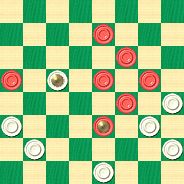
WHITE
White to Play and Win
W:W31,28,25,24,21,20,K14:BK23,19,16,15,13,11,7.
If you were Tina, would you be able to teach Joey a much-merited lesson in this position? Don't be intimidated; work out the solution and be sure to click on Read More for the correct answer and the unexpected conclusion to our story.![]()
The Checker Maven is produced at editorial offices in Honolulu, Hawai`i, as a completely non-commercial public service from which no income is obtained or sought. Original material is Copyright © 2004-2026 Avi Gobbler Publishing. Other material is public domain, AI generated, as attributed, or licensed under CC1, CC2, CC3 or CC4. Information presented on this site is offered as-is, at no cost, and bears no express or implied warranty as to accuracy or usability. You agree that you use such information entirely at your own risk. No liabilities of any kind under any legal theory whatsoever are accepted. The Checker Maven is dedicated to the memory of Mr. Bob Newell, Sr.

